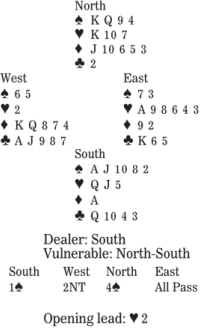When unsure, play probabilities
By Phillip Alder ( China Daily ) Updated: 2015-05-30 07:45:53
|
|
|
Photo/China Daily |
Agnes de Mille, a former dancer and choreographer, said, "Living is a form of not being sure, not knowing what next or how. ... We guess. We may be wrong, but we take leap after leap in the dark."
At the bridge table, we do have to guess occasionally, but more often there are sufficient clues to make the right choice clear.
In today's deal, cover the South and West hands. South is in four spades. West leads the heart two. How should East plan the defense?
In the auction, West used the Unusual No-trump, showing at least 5-5 in the two lowest-ranking unbid suits: clubs and diamonds. North just blasted into four spades, hoping that if the opponents sacrificed in five clubs, partner would be able to double.
When West leads the heart two, East knows that it is either a singleton or from three cards. When you face an either-or position like this, usually the bidding will tell you which it is.
Here, if West started with 0-3-5-5, South would have began with an unlikely 7-1-1-4. If West held 2-1-5-5, though, South would have 5-3-1-4, which is much more probable.
So, East wins the first trick and (tries to) give his partner a heart ruff at trick two. And because East's potential re-entry is in clubs, the lower-ranking of the other two side suits, he carefully leads his heart three, which sends a so-called suit-preference signal.
Now the pressure is on West. After ruffing at trick two, he must trust his partner and shift to a low club. East will win with his king and deliver a second heart ruff to defeat the contract.
|
|
|
|
|
|
|
|


























 Raymond Zhou:
Raymond Zhou: Pauline D Loh:
Pauline D Loh: Hot Pot
Hot Pot Eco China
Eco China China Dream
China Dream China Face
China Face






